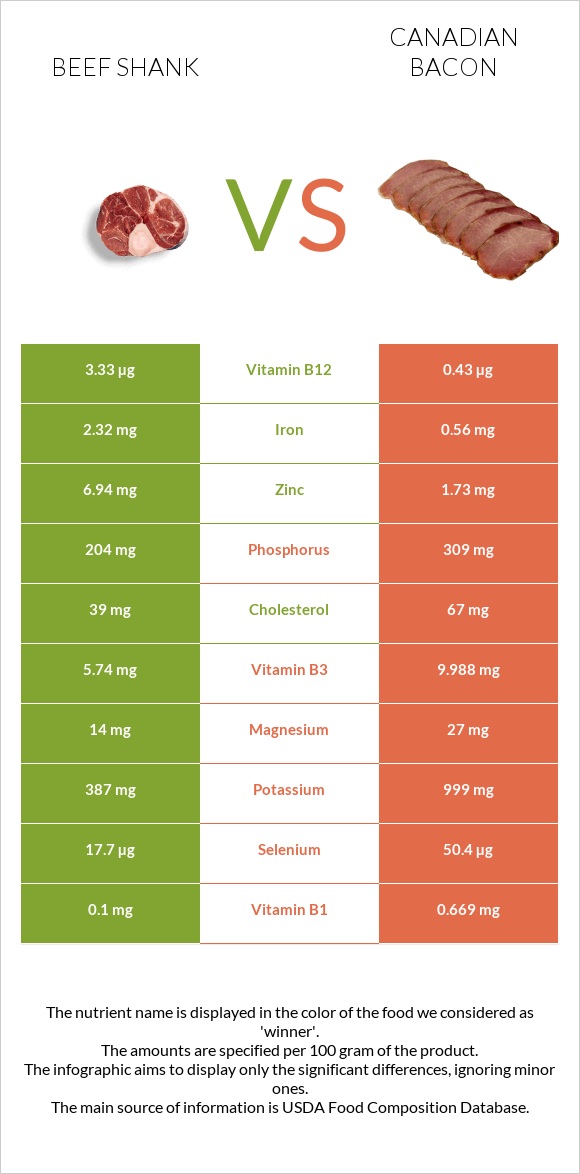Beef shank vs. Canadian bacon — In-Depth Nutrition Comparison
Compare
What are the main differences between beef shank and Canadian bacon?
- Beef shank is richer in vitamin B12, zinc, iron, copper, and vitamin B6, while Canadian bacon is higher in vitamin B1, selenium, vitamin B3, and potassium.
- Beef shank's daily need coverage for vitamin B12 is 140% higher.
- Canadian bacon has 7 times less iron than beef shank. Beef shank has 3.86mg of iron, while Canadian bacon has 0.56mg.
- Beef shank is lower in sodium.
We used Beef, shank crosscuts, separable lean only, trimmed to 1/4" fat, choice, cooked, simmered and Canadian bacon, cooked, pan-fried types in this comparison.
Infographic

Infographic link
Mineral Comparison
Mineral comparison score is based on the number of minerals by which one or the other food is richer. The "coverage" charts below show how much of the daily needs can be covered by 300 grams of the food.
| Contains more CalciumCalcium | +357.1% |
| Contains more IronIron | +589.3% |
| Contains more CopperCopper | +173% |
| Contains more ZincZinc | +506.4% |
| Contains less SodiumSodium | -93.6% |
| Contains more ManganeseManganese | +25% |
| Contains more PotassiumPotassium | +123.5% |
| Contains more PhosphorusPhosphorus | +17.5% |
| Contains more SeleniumSelenium | +68% |
Vitamin Comparison
Vitamin comparison score is based on the number of vitamins by which one or the other food is richer. The "coverage" charts below show how much of the daily needs can be covered by 300 grams of the food.
| Contains more Vitamin B2Vitamin B2 | +13.5% |
| Contains more Vitamin B6Vitamin B6 | +32.1% |
| Contains more Vitamin B12Vitamin B12 | +781.4% |
| Contains more FolateFolate | +150% |
| Contains more Vitamin B1Vitamin B1 | +377.9% |
| Contains more Vitamin B3Vitamin B3 | +69.6% |
| Contains more Vitamin B5Vitamin B5 | +75.6% |
All nutrients comparison - raw data values
| Nutrient |  |
 |
DV% diff. |
| Vitamin B12 | 3.79µg | 0.43µg | 140% |
| Zinc | 10.49mg | 1.73mg | 80% |
| Vitamin B1 | 0.14mg | 0.669mg | 44% |
| Iron | 3.86mg | 0.56mg | 41% |
| Sodium | 64mg | 993mg | 40% |
| Selenium | 30µg | 50.4µg | 37% |
| Vitamin B3 | 5.89mg | 9.988mg | 26% |
| Choline | 104.8mg | 19% | |
| Potassium | 447mg | 999mg | 16% |
| Copper | 0.172mg | 0.063mg | 12% |
| Protein | 33.68g | 28.31g | 11% |
| Phosphorus | 263mg | 309mg | 7% |
| Vitamin B6 | 0.37mg | 0.28mg | 7% |
| Fats | 6.36g | 2.78g | 6% |
| Vitamin B5 | 0.41mg | 0.72mg | 6% |
| Saturated fat | 2.29g | 1.039g | 6% |
| Cholesterol | 78mg | 67mg | 4% |
| Monounsaturated fat | 2.86g | 1.255g | 4% |
| Calories | 201kcal | 146kcal | 3% |
| Calcium | 32mg | 7mg | 3% |
| Vitamin E | 0.41mg | 3% | |
| Vitamin B2 | 0.21mg | 0.185mg | 2% |
| Folate | 10µg | 4µg | 2% |
| Polyunsaturated fat | 0.21g | 0.485g | 2% |
| Carbs | 0g | 1.8g | 1% |
| Vitamin D | 9 IU | 1% | |
| Magnesium | 30mg | 27mg | 1% |
| Vitamin D | 0.2µg | 1% | |
| Net carbs | 0g | 1.8g | N/A |
| Sugar | 1.2g | N/A | |
| Manganese | 0.02mg | 0.016mg | 0% |
| Vitamin K | 0.2µg | 0% | |
| Trans fat | 0.008g | N/A | |
| Tryptophan | 0.377mg | 0.332mg | 0% |
| Threonine | 1.471mg | 1.226mg | 0% |
| Isoleucine | 1.514mg | 1.32mg | 0% |
| Leucine | 2.662mg | 2.294mg | 0% |
| Lysine | 2.802mg | 2.479mg | 0% |
| Methionine | 0.862mg | 0.764mg | 0% |
| Phenylalanine | 1.315mg | 1.158mg | 0% |
| Valine | 1.638mg | 1.41mg | 0% |
| Histidine | 1.153mg | 1.134mg | 0% |
| Omega-3 - DHA | 0g | 0.001g | N/A |
| Omega-3 - ALA | 0.011g | N/A | |
| Omega-3 - DPA | 0g | 0.006g | N/A |
| Omega-3 - Eicosatrienoic acid | 0.003g | N/A | |
| Omega-6 - Gamma-linoleic acid | 0.001g | N/A | |
| Omega-6 - Dihomo-gamma-linoleic acid | 0.008g | N/A | |
| Omega-6 - Eicosadienoic acid | 0.014g | N/A | |
| Omega-6 - Linoleic acid | 0.36g | N/A |
Macronutrient Comparison
Macronutrient breakdown side-by-side comparison
Protein:
33.68 g
Fats:
6.36 g
Carbs:
0 g
Water:
58.21 g
Other:
1.75 g
Protein:
28.31 g
Fats:
2.78 g
Carbs:
1.8 g
Water:
62.5 g
Other:
4.61 g
| Contains more ProteinProtein | +19% |
| Contains more FatsFats | +128.8% |
| Contains more CarbsCarbs | +∞% |
| Contains more OtherOther | +163.4% |
~equal in
Water
~62.5g
Fat Type Comparison
Fat type breakdown side-by-side comparison
Saturated fat:
Sat. Fat
2.29 g
Monounsaturated fat:
Mono. Fat
2.86 g
Polyunsaturated fat:
Poly. Fat
0.21 g
Saturated fat:
Sat. Fat
1.039 g
Monounsaturated fat:
Mono. Fat
1.255 g
Polyunsaturated fat:
Poly. Fat
0.485 g
| Contains more Mono. FatMonounsaturated fat | +127.9% |
| Contains less Sat. FatSaturated fat | -54.6% |
| Contains more Poly. FatPolyunsaturated fat | +131% |





